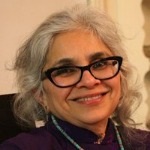Manisha Desai
Professor Emerita of Sociology and Asian and Asian American Studies
PhD, 1990, Sociology, Washington University, USA
MSW, 1982, Bombay University, India
BSc, 1978, Microbiology, Bombay University, India
Spring 2021 Course(s):
SOCI 2201-001: Introducing India: Diversity and Dynamism
This course will help you to develop an understanding of contemporary India, the largest and incredibly diverse democracy in the world. You will be introduced to readings and visual materials on changing social structures; economic realities that range from subsistence agriculture to high tech parks; politics and social movements that both challenge and reproduce myriad inequalities; and rich cultural diversity encompassing Bollywood to classical music and dance; and sports.
Fall 2020 Course(s):
SOCI 5251-001: Core Theorirsts
Spring 2020 Course(s):
SOCI 5003 – 001: Teaching Sociology
BIOGRAPHICAL STATEMENT:
Manisha Desai’s areas of research are transnational feminisms, gender, globalization, and human rights, and contemporary Indian society. Currently, she’s working on a book manuscript on the Changing Contours of the Women’s Movement in India. Based on nine months of ethnographic research, funded by the American Institute of India Studies Senior Fellowship, she examines the new articulations of women’s activism with Dalit struggles, Anti-Communalism, and the rural and urban crises of neoliberal policies for the marginalized. Her forthcoming publication with Rianka Roy, Krantijyoti Gyanjyoti Savitribai: The Light of Revolution and Knowledge is the start of a new project on what she calls “the second decolonial moment,” in the Global North and South, to bring the work of 19th century Dalit theorist Savitribai Phule and her collaborators in the Satya Shodhak Samaj (the Society of Truth Seekers) to a larger audience.
Her last book, Subaltern Movements in India: The Gendered Geography of struggle Against Neoliberal Development (Routledge 2016) analyzed three subaltern movements by adivasis (indigenous people), farmers, and fishers against “development by dispossession.” She showed how the movements succeeded because of the deepening of democracy in India, albeit in tandem with coercive state initiatives, but gender remains a challenge for the movements, the state, and social theory. Drawing upon innovative perspectives in social-legal studies, critical geography, and feminist studies she showed how ongoing relationships among various local fields of protest enabled activists and advocates to use legalism from below to exploit the changing legal architecture of the Indian state to win substantial victories for subaltern groups. Her other books include Gender, Family, and Law in a Globalizing Middle East and South Asia (co-edited with Ken Cuno, Syracuse University Press, 2010) and Gender and the Politics of Possibilities: Rethinking Globalization (Rowman and Littlefield, 2008) and (co-edited with Nancy Naples) Women’s Activism and Globalization: Linking Local Struggles to Transnational Politics (Routledge 2002).
She is the recipient of several awards including the 2019 Sociologist for Women in Society’s Feminist Mentor of the Year Award, the Department of Sociology’s 2017 Faculty Mentor of the Year award; the 2016 National Compact for Faculty Diversity Mentor of the Year award and the 2015 Sociologist for Women in Society’s (SWS) Distinguished Feminist Lecturer award that recognizes a body of feminist scholarship that has made important contributions to further our understanding of Gender.
She has held several elected offices in the International Sociological Association, American Sociological Association and SWS, including President of SWS in 2007, and served on numerous editorial boards including American Sociological Review and the International Feminist Journal of Politics. Her commitment in all these offices has been to bring in voices from the Global South and marginalized communities in the Global North to engage in a critical public sociology that is centered around social justice and a critical human rights perspective. For example, as President of Sociologists for Women in Society she organized the annual winter meeting in post-Katrina New Orleans and brought together local activists working for justice with women activists from India, Nicaragua, and Florida who had worked in post-disaster situations to share knowledge and experiences of rehabilitation when natural disasters reinforce existing social inequalities.
As a scholar activist, she has been involved in advocacy and activism around social and gender justice issues at the United Nations, as SWS’s representative to its Economic and Social Council, at the World Social Forum, and US Social Forum. Since 2017 she has served on the Everywoman Everywhere’s Global Treaty to End Violence Against Women.
Committed to buen vivir, she’s also a trained yoga teacher and practitioner as well as a trained Indian classical dancer in the Bharat Natyam style.

| manisha.desai@uconn.edu | |
| Phone | 860 486-2303 |
| Office Location | 110 Manchester Hall |